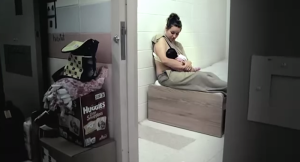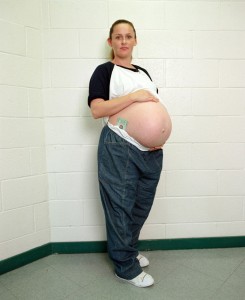This post is attributed to Maya Oppenheimer & originally appeared on VICE UK.
Pregnancy can be an anxious experience for all women: fears of miscarrying, birth defects, difficult labor, and how you’ll cope are natural when you’re carrying a child. If you’re pregnant in prison, however, natural anxieties can become terrifying. What happens if you can’t get proper healthcare? What happens if you’re not let out of your cell when your waters break? What happens if you miscarry and no one knows what to do?
Being pregnant in prison comes with myriad fears—most distressing of all is the question of whether you will be able to keep your baby. While female prisoners in the UK are legally allowed to keep their babies for the first 18 months in a secure Mother and Baby Unit, the vast majority of children are separated from their mothers. In turn, many women go into labor knowing that their baby will be lifted from their arms within hours, that they will return to prison later alone, swollen, and lactating.
According to the NSPCC’s latest report, an average of 100 babies are born in prisons in England and Wales each year. Yet antenatal care in prisons remains substandard. Not only is there no universal standard for what prisons have to provide for pregnant women, there is no legal requirement to offer antenatal classes. You might be bearing a child but you’re a prisoner at all times. Evidence has shown, too, that women inside are more likely to experience birth defects or have stillborn babies than those on the outside.
Two weeks overdue, Maddie’s labor was defined by fear. “For 14 days I’d been sitting in the prison, overdue, before they finally transported me to hospital in a van to induce me,” she says. “In labor, nothing was working. First, they gave me tablets, but that didn’t work. Then they broke my water, but that didn’t work either. Eventually then they put me on a higher-dose drip.”
It was only when the prison officer came in and told Maddie that she could keep her baby that “it came out straight away.” Within 30 minutes, Ruby Logan* came into the world, within touching distance of two prison guards.
 “It was horrible having two people I barely knew with me at all times. Especially in such a tiny room that only had enough space for a small hospital bed with two chairs at the end,” Maddie recalls. “Imagine waking up to deal with a crying baby in the night and, right at the end of your bed, you see two men officers watching you. You would have thought they’d at least stand outside the door. It’s not like you can escape. The small windows didn’t even open.”
“It was horrible having two people I barely knew with me at all times. Especially in such a tiny room that only had enough space for a small hospital bed with two chairs at the end,” Maddie recalls. “Imagine waking up to deal with a crying baby in the night and, right at the end of your bed, you see two men officers watching you. You would have thought they’d at least stand outside the door. It’s not like you can escape. The small windows didn’t even open.”
Maddie’s entire pregnancy was plagued by uncertainty. “I thought I’d have to hand her out to a family member and not see her for over two and a half years, until I’d finished my sentence,” she explains. “I was scared about all sorts of other things, too. When I’d press my buzzer and nobody would come, I’d get paranoid that the same thing would happen when I needed to go into labor.
“I was also frightened that I’d miscarry or that they wouldn’t call my family in time for the birth. Ah god,” she exhales, deeply. “All the worries got me down. It’s not like being pregnant on the outside. It’s a lot more pressure. If you get scared, you can’t just go see a doctor, you have to wait.”
Maddie is adamant that she received no special treatment as a mother-to-be in prison. “They weren’t nicer to me because I was pregnant. I’d have my regular scans inside the prison, but they don’t keep an extra eye on you. I had no antenatal classes. There were no special mattresses. If I cried and got upset, all they’d do was get an officer to come and sit with me and that was it. I won’t put them all down, but most don’t really care. They’re just there to do their job.”
Arrested for attempting to smuggle drugs and a phone into prison for a friend, Maddie was initially told she’d get five years. But this was dropped to three and a half years when the judge found out she was pregnant. “I was two weeks pregnant when I got caught smuggling. They nicked me straightaway and I was put on remand and sentenced after a few weeks,” she explains. A former heroin addict, Maddie was smuggling drugs in to pay off debts. “It’s a long story, but I was bullied into taking it in for someone because I owed a lot of money, and then the debt would’ve been wiped off.”
During her sentence, Maddie was moved from Holloway in London to Bronzefield and then back to Eastwood Park where there was a Mother and Baby Unit. “It was a lot better than prison,” she says. “You could go outside and walk around the grounds with your baby. It’s obviously fenced off but there’s a big garden. You’ve got to be in your room at certain times but you have keys to your own door. It’s not like you get locked in with your baby.”
Without Ruby, Maddie says she wouldn’t have been able to cope. “I just wish they hadn’t waited till the last moment to tell me that I’d be allowed to keep her. I understand they’ve got to do checks—if I’d been in prison for violence before, I wouldn’t have been able to go to the unit—but I hadn’t.”
Maddie and Ruby were finally released from the Mother and Baby Unit in 2010 when Ruby was six and a half months old. “Ruby is five now and is doing really well,” says Maddie. “She’s absolutely lovely. She doesn’t remember anything from the prison, but I suppose I’ll have to tell her when she’s older.”
Maddie is not alone in her experience. The latest figures show that two babies are born in prison every week. Despite this, the physical and psychological needs of pregnant women continue to be neglected. From the chief inspector and head governor to the wing officers, prison is an institution designed by men, for men.
Moreover, lots of women only find out they are pregnant after their preliminary health check-up. In turn, they are forced to deal with this news on their first night behind bars. Mothers-to-be are housed in standard prison accommodation, sleeping on wafer-thin plastic mattresses with threadbare blankets. Forced to eat whatever custodial cuisine is thrown at them—in spite of inexplicable cravings—like everyone else they must navigate the punitive, rigid routine of prison. If they have morning sickness and skip breakfast, a mid-morning round of dry toast isn’t really an option.
As well as inadequate food and nutrition, evidence has shown that persistent institutional failures lead to substandard antenatal care and a lack of emotional support. In a recent study of 1,082 mothers in prison estates in England, almost two thirds reported that they were depressed and that 56 percent were lonely.
Miscarriage is another devastating issue, albeit one that gets little coverage. Public Health England does not record statistics on miscarriages across the prison estate. In spite of this, miscarriage is thought to be widespread, with chilling stories of women being forced to clean up their own blood. Miscarrying is a traumatic, painful, and heartbreaking experience in the comfort of your home or a hospital room. But in a cold concrete cell, alone, it is a living nightmare.
Clive Chatterton, one of the country’s most experienced prison governors, has also experienced the failings of the prison system first-hand—from the other side of the bars. Chatterton, 62, started working as a screw at the infamous Strangeways Prison in the 70s, before going on to work at 13 different prisons and serving as the chief governor at three of them. He retired in 2012.
In the 37 years he worked in our prison system, Chatterton says he was most haunted by his time as governor of Styal, a woman’s prison. In his letter to former justice secretary, Ken Clarke, he writes: “I have never come across such a concentration of damaged, fragile and complex-needs individuals.”
“Styal was a real eye-opener,” he tells me. “We housed 460 women and sometimes over 40 women might be pregnant at any one time. They’d all be at different stages of their pregnancy. Pregnant women would often apply for our on-site Mother and Baby Unit but, if they were refused a place, their babies would often go into care. Staff used to say watching this separation after 18 months together was one of the most traumatic experiences they’d ever seen.”
Chatterton also tells me that many women chose not to apply for places in Mother and Baby Units. Instead, they would leave the child with relatives. “Distance was another thing which put women off applying. If Styal was full, they’d be applying for a place which could be 100 miles away from their family.”
Perhaps fittingly, Styal is an old Victorian orphanage. Unlike other institutions of its kind, its recent inspections have been positive. “The rooms are brightly colored like you’d have at a kids’ nursery, but not too much because obviously the mom is in there as well,” says Chatterton. “There’s a crèche and nannies who would take the babies for walks outside of the prison and daily visits were allowed.”
While Chatterton might be positive about the Mother and Baby Unit, he remains insistent that prison is not the right environment for a mother-to-be. “Let’s face it, prison is not the greatest place for anyone to be, and one would say that it’s less conducive to someone if they’re pregnant. Especially when you remember that most women are sent to prison for non-violent, low-level offending.”
As the women’s prison population continues to grow—increasing by over a third in the last decade—more and more infants are being separated from their mothers. Even though there are eight Mother and Baby Units in the UK, with a joint capacity of 73 mothers and their babies in total, rejection rates are sky high. According to a recent report by the NSPCC, “Places are under-utilized and frequently lie empty across the women’s estate.” In 2013, there were only 38 mothers resident in MBU’s—just over half the capacity.
Why are these units so under-used? Rigid risk assessment and security criteria mean applications are frequently rejected. On top of this, many women choose not to apply in the first place. This might be because they have been told their application will be refused, or, perhaps they believe that prison is the wrong place for a baby. They may also not want to move far away from family or their older children.
Whatever the reason, the prison system continues to disrupt maternal relationships irreparably. Even in situations when the mother is reunited with their baby on release, they will have missed important stages in their child’s development. The infant will now be attached to another caregiver and the mother might feel like a stranger.
It goes without saying that, when you imprison a pregnant woman, you’re also imprisoning her—entirely innocent—baby. And, behind bars, this baby is denied the safe, stimulating environment it deserves. Unsurprisingly, the long-term affects on their physical, social, and emotional development can be significant.
The same can be said for the children who are left behind when a woman is locked up. After all, two thirds of female prisoners have children under 16, while a third have a child under five. In due course, 17,000 children are separated from their mothers each year because of imprisonment, and it’s estimated that 3000 of them are under the age of two. Out of these children, only five per cent are able to remain in their own home.
In spite of this, the children of prisoners continue to be an invisible group, apparently unworthy of our attention. Universal health and early years services will not necessarily know that a baby has a parent in prison, either. But as life goes on, children of prisoners suffer—they are twice as likely to have mental health problems as their peers.
As a highly vulnerable, troubled demographic plagued by domestic violence, mental health problems, and addiction, it’s clear that female offenders need help—not the rigid torment of punishment. Not only have half of women in prison experienced domestic violence, 53 percent have been victims of childhood abuse, and over a third have experienced sexual abuse. Moreover, of the 3,959 women who are currently in prison in Britain, over eight in ten are inside for non-violent crimes, and are far less likely than male prisoners to have any previous convictions.
As a result, Alex Hewson from the Prison Reform Trust argues that, “Pregnant women should not be sent to prison in the first place. It’s not the right environment for a child to be growing.”
In the words of Dostoevsky, “A society should be judged not by how it treats its outstanding citizens but by how it treats its criminals.”
* Maddie and Ruby’s names have been changed
Follow Maya on Twitter.















You must be logged in to post a comment.